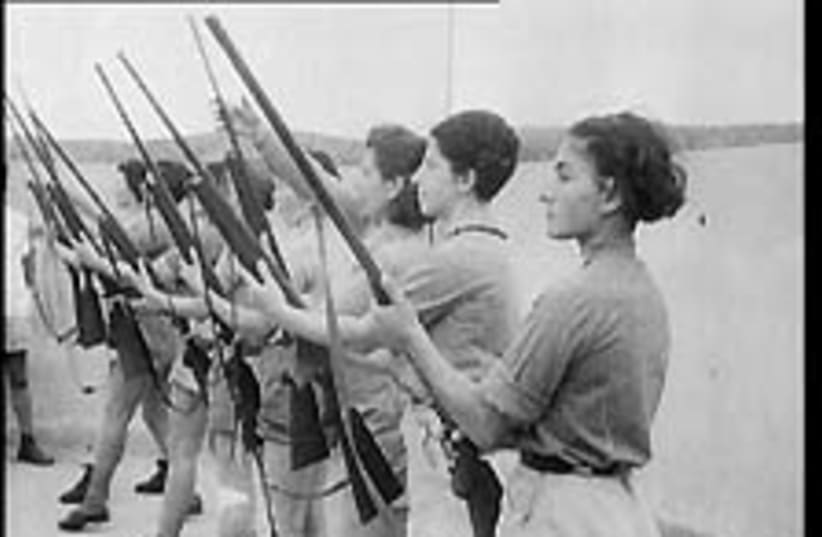Cinefile: Fascinating archival footage of pre-state Israel and more
The Jewish festival opens on a nostalgic note, while Israeli films fail to show up at Sundance.
The 9th Jerusalem Jewish Film Festival opened last Saturday at the Jerusalem Cinematheque with the documentary Etz O Palestina. The film is a fascinating collection of archival footage, shot by Nathan Axelrod and recut by Joel Silberg and Uri Zohar in the early Sixties. The movie was produced by Axelrod and Avraham (Pashanel) Deshe, is narrated by Chaim Topol, and features footage of a very young Hanna Maron dressed as a boy in an early role, so its cast and crew is truly a Who's Who of early Israeli entertainment. Introducing the screening, a remarkably youthful Topol quipped: "I miss Uri Zohar." Zohar, now an ultra-Orthodox rabbi who abandoned his career as a director/actor many years ago, was not in attendance. Maron, who was, shot back: "I don't miss him" - a comment that drew laughter from many who once counted the rabbi as one of their most secular friends.
The movie, surprisingly light and funny, was full of interesting images and moments of pre-state Palestine. As images of the first cafés in Tel Aviv were shown, Topol, narrating, informed the audience that in those days, land cost 10 liras for one dunam (one quarter acre), and that the café Cassit and the HaBima theater were built on property acquired for those prices. Joking about Jewish workers, the narrator said: "Not everyone could be a builder - just poets." At another moment, he said: "In every corner, a cornerstone." Even in 1962, people were apparently already mourning the fact that Israeli Jews no longer worked with their hands: "Take a look at these Jewish workers, that's the last time you'll see Jews doing any labor."
Of course, the film becomes more serious when it documents the unrest and the outbreak of war following the UN Partition Plan. Overall,Etz O Palestina was a wonderful way to open this year's festival, and anyone who missed it then should see it at the earliest opportunity. It's a brilliant, fast-paced time capsule of the pre-state period and the birth of Israel.
MOST OF THE LINEUP for this year's Sundance Film Festival has been announced and, in spite of the banner year in Israeli film, Israel has a surprisingly low profile. No Israeli movies were included in the World Documentary category, and there's only one film among the World Dramatic Feature competition, Strangers, written and directed by Erez Tamor and Guy Nattiv. The film stars Liron Levo and Lubna Azabal as an Israeli man and a Palestinian woman who meet by chance and get involved when they are both in Germany to see the World Cup finals. Levo and Azabal (who starred in Paradise Now) are both very good and it's a well-made film, but was overshadowed by the much stronger The Band's Visit when it was first screened at this summer's Jerusalem festival.
Although Dror Shaul's Sweet Mud took top prize in the World Drama category last year at Sundance, I doubt that Strangers will take home any awards, although who knows? There are two other films from the Middle East in this competition - Under the Bombs from Lebanon and Captain Abu Raed from Jordan. Under the Bombs, directed by Philippe Aractingi, looks at the aftermath of the Second Lebanon War, as a woman returns to Beirut to try to find her sister and nephew. Lebanonese filmmakers make a few movies every year, and the less political Caramel, about the romantic dilemmas of a group of friends who meet at a beauty parlor, is Lebanon's official entry for the Foreign Language Oscar. Much more surprising is the fact that Jordan has a film, because I can't remember seeing a movie from that country at any festival, ever. The Sundance Website describes Amin Matalqa's Captain Abu Raed as the story of "an aging airport janitor who is mistaken for an airline pilot by a group of poor neighborhood children, and who then weaves fantastical stories to offer hope in a sad, and sometimes unchangeable, reality."
if(catID != 151){
var cont = `Take Israel home with the new
Jerusalem Post Store
Shop now >>
`;
document.getElementById("linkPremium").innerHTML = cont;
var divWithLink = document.getElementById("premium-link");
if(divWithLink !== null && divWithLink !== 'undefined')
{
divWithLink.style.border = "solid 1px #cb0f3e";
divWithLink.style.textAlign = "center";
divWithLink.style.marginBottom = "40px";
divWithLink.style.marginTop = "40px";
divWithLink.style.width = "728px";
divWithLink.style.backgroundColor = "#3c4860";
divWithLink.style.color = "#ffffff";
}
}
(function (v, i){
});

